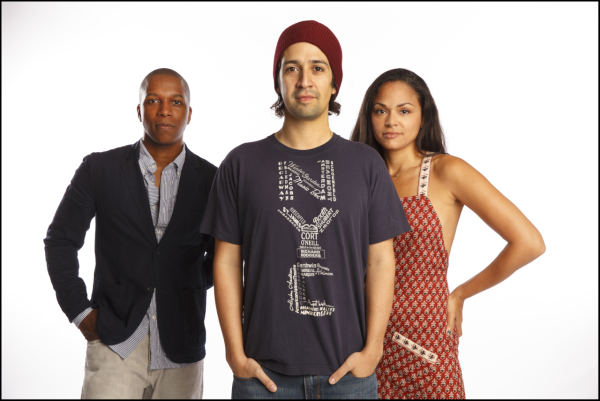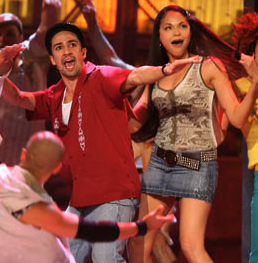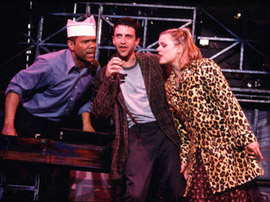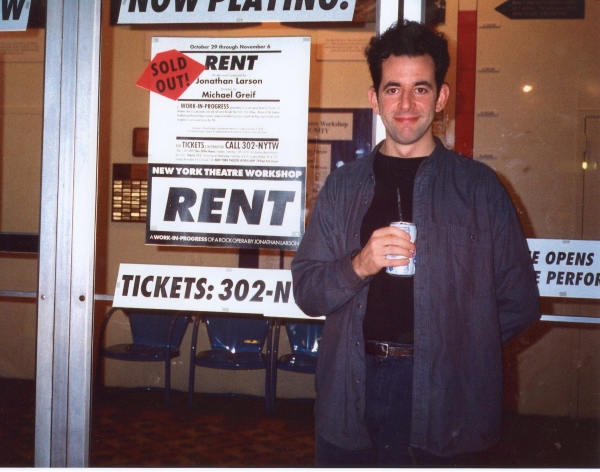What a Way to Spend a Day: Lin-Manuel Miranda, Karen Olivo, and Leslie Odom Jr. on Living Inside Jonathan Larson's tick, tick… BOOM!
The late ”Rent” composer’s musical autobiography hits close to home for the Encores! cast.
Jonathan Larson never got to see tick, tick… BOOM! performed on a New York stage. An autobiographical precursor to his hit Broadway musical Rent, tick, tick… BOOM! follows Jon, a struggling composer whose impending 30th birthday and negligible amount of success make him question his artistic path. Larson began performing the piece as a solo show in 1990, but it wasn't until 2001 — five years after his sudden death (which occurred the night before the first off-Broadway performance of Rent) — that it made its off-Broadway premiere as the three-person musical playwright David Auburn has since molded from Larson's original material. Thirteen additional years later, the piece has finally made its way back to Manhattan as part of the New York City Center Encores! new Off-Center series, playing five performances June 25-28.
Tony-winning composer Lin-Manuel Miranda, in a turn of theatrical karma, takes on the central role of his artistic idol, Larson, who broadened the musical-theater spectrum with Rent's famous rock-opera score, just as Miranda did with his Pulitzer Prize-nominated and Tony-winning hip-hop musical In the Heights. "I look to Jonathan's career as such a blueprint from beginning to end," said Miranda, sitting around a table with his costars, Leslie Odom Jr. (Smash) and Tony winner Karen Olivo (West Side Story) — both Rent alums with their own strong emotional attachments to Larson's brief career.
An undeniable air of camaraderie and commitment filled the room as the group of friends and fellow artists spoke about Larson's revealing work — a story of creative and personal struggle they unanimously profess to know all too well. The trio spoke with TheaterMania about these experiences, Olivo adding the unique perspective of someone who publicly exited show business just last year because of the very struggles so eloquently depicted in tick, tick… BOOM! Fortunately, Miranda's writing prowess allowed him to compose a text message persuasive enough to bring Olivo (his former In the Heights and West Side Story collaborator) back to New York for one more dive into the emotional muck.

(© Joan Marcus)
When were you all introduced to this show?
Lin-Manuel Miranda: I saw it three times my senior year of college. It was like a Bat-Signal for me. It was literally like, this is everything you're going to go through for the next eight years of your life, and it was. It's the specificity and the universality of being an artist in this city, and there's a million people trying to do what you're trying to do. I really wanted to do this piece while I was still in the ballpark of the age to do it because it meant so much to me as a kid.
Karen Olivo: I had just finished doing Rent and we used to see lots of shows together as a company so they gave us tickets. But…I had actually seen a VHS tape of Jonathan, playing "Sunday" and "Johnny Can't Decide." [Watching this] was kind of our introduction when you became part of the [Rent] company. I remember being — even then, not really knowing what the show would do in my life — knowing that I was so happy that I got to actually see the man do it.
Leslie Odom Jr.: tick, tick… BOOM! actually came out when I had left New York, but Jonathan meant so much to a generation of theater practitioners. Because he left us so soon we just clung to anything we could; anything about the man that would tell us more about this guy that created this thing that we loved so much. That's why working on this show has been so fun because I'm getting to know him in a different way — from inside it.
Karen, you publicly announced last year that you had decided to leave the business and move back to Madison, Wisconsin. Did you come back just to do this project?
Karen: Yes. Actually, Lin brought me back.
Lin: You make it sound like it was hard! It was a two-text conversation. I said, "tick, tick… BOOM! I'll play Jonathan. Do you want to play Susan?" She wrote, "Always wanted to play that part! I'm in!" That was how fast it was. [laughs]
How has it been working on a piece that hits so close to your own personal life?
Karen: It's so crazy for me to watch them go through it because I'm equal parts Michael, Jonathan, and Susan. When I was in L.A., I was struggling with, Do I go big by becoming a TV star and forget everything that I know and I love about the theater and forget my integrity? I had that option. And as I was looking at my BMW, I was like f*ck this. Before that, I was Jonathan, basically just sitting there like, This is crazy. This is so hard. Why am I questioning myself and my art? And then I ended up becoming Susan, who's like, No, I want a dishwasher. [laughs]
Does doing the show help you work through all of these conflicting feelings or does it just complicate things even more in your mind?
Karen: There are portions of this show that I have to be really analytical [about], because if I allow what I feel to become a portion of this, I will be a puddle on the floor, and that doesn't service the piece. So there are moments where I'm like, Note to self, shut it off. Make big choices and try to connect the dots and be a performer and not an artist, because it's hot-button.
It sounds like it was something you wanted to explore if it only took two texts to get you here.

(© Joan Marcus)
Karen: Had it been someone other than Lin, I wouldn't be here. Because it's a week, it's quick, [and] it's material that I revere, and knowing that these boys have my back and we're in this to make something happen, it turns into something else.
Leslie: We're happy to have her for two weeks.
Lin: Like Brigadoon.
Karen: [laughs] Don't ever make me sound like Brigadoon.
Most people would probably look at the success all three of you have had in your careers and assume you've made it past all of the struggle and internal conflict.
Karen: That's not real. That's the Entertainment Tonight version of what we do.
Lin: I have yet to meet a Tony Award that pays a rent bill.
Karen: It only spins. That's all it does.
Lin: And it adds a prefix to your name in articles. Other than that, you still struggle to pay rent, you still struggle to make decisions that make sense for your family and make sense for you. None of that goes away. I joked yesterday when they were doing our photo shoot, some TV exec is looking at that picture and going, "Oh man, those would be great best friends for the white male leads of our new procedural!" We could go do that. I could go be the friend to the white detective on a TV show and make a sh*t ton of money for a few years. Or I could stay home and not be paid to work on Hamilton for five years, which is what I've been doing with little odd jobs here or there. You're constantly making decisions to recommit to your work. That's a decision you have to make every day. You have to make the time for what you love, and that only gets harder the more you have to do. Not easier.
Karen: And I think the idea of what people think you should be — that also starts to factor into things. You have to constantly check people and be like, I know this is what you want of me but I am just a human being. I am not "Tony Award winner Karen Olivo." I am Karen Olivo, who puts her pants on just the same way.
Lin: Well, you put your pants on weird.
Karen: [laughs] That's true. But "making it" gives you just a little bit more of — now I have to prove something to people, or I have to re-educate people, and make them treat me like a regular person. With TV, monetarily, you're rolling in it. But all of a sudden, the art starts to get overshadowed by the big business and the corporate things. All of these things start to infiltrate the art. It's a balancing act.

in the 2001 off-Broadway premiere of Jonathan Larson’s tick, tick…BOOM!
(© Joan Marcus)
One of the lyrics that strikes a chord with artists who see tick, tick…BOOM! is when Jonathan says, "what a way to spend a day," thinking about the specific moments he realized he wanted to commit his life to his art. Were there any "what a way to spend a day" moments in your lives that stand out to you?
Leslie: When Rent came out, and that show moved me the way that it did, I honestly thought that I would do that show until I was forty and then I would retire. I could not see what was better than that. I NEVER EVER got tired of doing that show. EVER EVER. When I f*cking got to put on my mic and rock out to that opening number, it was heaven and I never ever looked back.
Lin: It was my first piano recital. I was seven years old and I didn't practice. I was terrible at practicing piano…I was only allowed to play one piece because I had only practiced one piece well enough to play it in front of people. I finished the piece and they clapped and apparently my mom said that when I saw the applause and realized that was part of the deal, I went, "I know another one!" I played four pieces before they actually physically pulled me off the stage.
Karen: [laughs] I totally believe it. That's so you, dude.
Lin: That's the story I keep reliving.
Karen: Mine is probably the first time I ever got to do a monologue at community theater…it was the first time that I got to be alone onstage. I remember looking out and catching someone's eye and being like, Oh my God, they're with me…I control this room right now. It was a feeling of power. Knowing you could be a child and still captivate people and sort of maneuver them and manipulate them. I was like, This is the coolest place on earth! This is like superpowers! Why would I not want to do this?
The last song of the show repeatedly asks the question of "why" artists put themselves through all of this struggle. Can any of you answer that question for yourselves?
Lin: What's good about the show is that it ends with questions. That last song, the lyrics are a series of questions. "Why do we stay with people we know down deep just aren't right? Why does it take catastrophe to start a revolution?" I think that that question changes every day. What's beautiful about the show is that the journey Jonathan goes through is a journey of, I'm going to keep doing what it is I love no matter where that takes me. Whether that takes me to Rent and its success or continuing to struggle writing shows no one hears. I'm just going to keep doing what I love. And that's the question I think we all struggle with as artists. How do you continue to connect to the thing that got you here in the first place?
Do you hope to have a legacy similar to Jonathan's?
Lin: What I want to do is what Jonathan says he wants to do in the show: I want to write as much as I can — and we don't know how much time we get. We might get ten more days, we might get fifty more years. It's about getting as much done in the time that you have.









